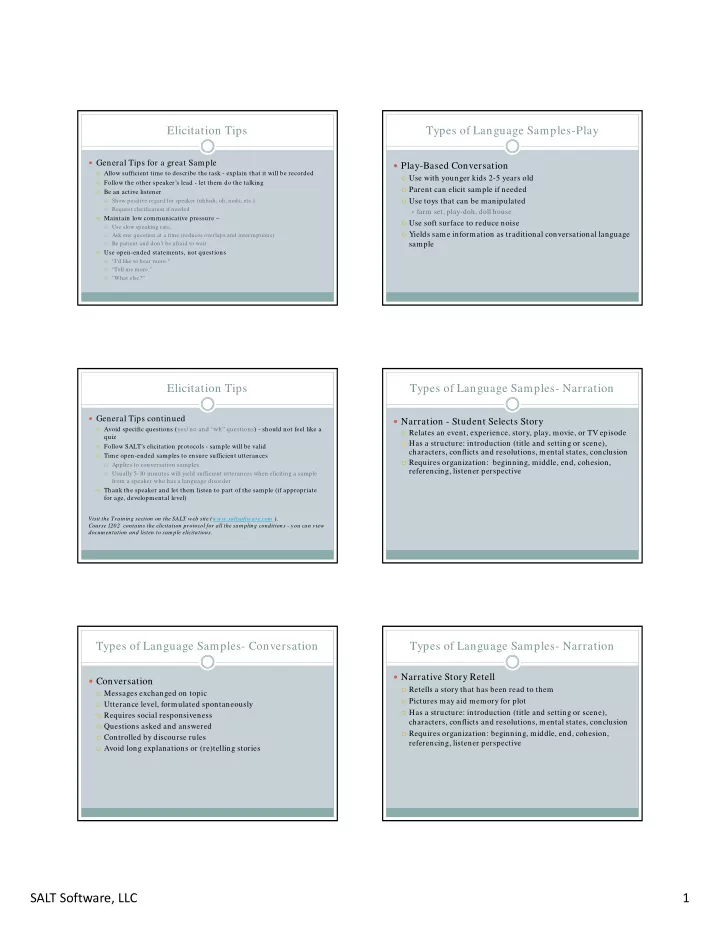

Elicitation Tips Types of Language Samples-Play General Tips for a great Sample Play-Based Conversation Allow sufficient time to describe the task - explain that it will be recorded Use with younger kids 2-5 years old Follow the other speaker’s lead - let them do the talking Parent can elicit sample if needed Be an active listener Show positive regard for speaker (uhhuh, oh, nods, etc.) Use toys that can be manipulated Request clarification if needed farm set, play-doh, doll house Maintain low communicative pressure – Use soft surface to reduce noise Use slow speaking rate, Yields same information as traditional conversational language Ask one question at a time (reduces overlaps and interruptions) sample Be patient and don’t be afraid to wait Use open-ended statements, not questions “I’d like to hear more.” “Tell me more.” “What else?” Elicitation Tips Types of Language Samples- Narration General Tips continued Narration - Student Selects Story Avoid specific questions (yes/ no and “wh” questions) - should not feel like a Relates an event, experience, story, play, movie, or TV episode quiz Has a structure: introduction (title and setting or scene), Follow SALT’s elicitation protocols - sample will be valid characters, conflicts and resolutions, mental states, conclusion Time open-ended samples to ensure sufficient utterances Requires organization: beginning, middle, end, cohesion, Applies to conversation samples referencing, listener perspective Usually 5-10 minutes will yield sufficient utterances when eliciting a sample from a speaker who has a language disorder Thank the speaker and let them listen to part of the sample (if appropriate for age, developmental level) Visit the Training section on the SALT w eb site (w w w .saltsoftw are.com ). Course 1202 contains the elicitation protocol for all the sam pling conditions - you can view docum entation and listen to sam ple elicitations. Types of Language Samples- Conversation Types of Language Samples- Narration Narrative Story Retell Conversation Retells a story that has been read to them Messages exchanged on topic Pictures may aid memory for plot Utterance level, formulated spontaneously Has a structure: introduction (title and setting or scene), Requires social responsiveness characters, conflicts and resolutions, mental states, conclusion Questions asked and answered Requires organization: beginning, middle, end, cohesion, Controlled by discourse rules referencing, listener perspective Avoid long explanations or (re)telling stories SALT Software, LLC 1
Types of Language Samples- Exposition SALT 2012 Reference Databases Exposition Database Samples Ages Grades Location Play 69 2;8–5;8 P,K WI “The imparting of information” Conversation 584 2;9–13;3 P,K,1,2,3,5,7 WI & CA Explain how to do something: play a game, perform an activity Narrative SSS 330 5;2–13;3 K,1,2,3,5,7 WI How to play football, soccer, chess, Sorry (Student Selects Story) Narrative Story Retell How to change a tire Frog, Where Are You? (FWAY) 145 4;4–7;5 P,K,1 Pookins Gets Her Way (PGHW) 101 7;0–8;11 2 WI & CA How to get to a specific destination A Porcupine Named Fluffy (APNF) 53 7;11–9;11 3 e.g., to speaker’s home, school, sports fields Doctor DeSoto (DDS) 201 9;3–12;8 4,5,6 How a bill becomes a law Expository 242 10;7–15;9 5,6,7,9 WI 4 US Gillam Narrative Tasks 500 5;0–11;11 Regions Bilingual Spanish/English Story Retell Frog, Where Are You? (FWAY) 2,070 5;0–9;9 K,1,2,3 TX & CA Frog Goes To Dinner (FGTD) 1,667 5;5–8;11 K,2 Frog On His Own (FOHO) 930 6;0–7;9 1 Bilingual Spanish/English Unique Story One Frog Too Many (OFTM) 475 4;1–9;7 K,1,2,3 TX & CA Narrative Story Retell Database Choosing the Appropriate Sampling Context Consider: Age Reason for referral; as determined with parent, teacher, other referral source Screening or intake data Other test information Ability level Grade: 4 th ,5 th 6 th Grades: P, K, 1 st Grade: 2 nd Grade: 3 rd What do you need to know about this speaker’s expressive Ages: 4;4 – 7;5 Ages: 7;0 – 8; 11 Ages: 7; 11 – 9; 11 Ages: 9;3 – 12;8 1 45 Samples 1 0 1 Samples 53 Samples 46 Samples (4 th ) language? 155 Samples (5 th /6 th ) Does SALT have an appropriate database for comparison? SALT 2012 Reference Databases Elicitation Quiz #1! 3 rd grade student Sampling Contexts Primary English Speakers Age: 8;8 ◦ Conversations Background: Standard American English spoken, no ◦ Narrative (SSS, Story Retell) ◦ Expositories S/ L Services Bilingual Spanish/ English Speakers Concerns: Losing listeners when speaking, slow rate ◦ Narrative (Story Retell, Unique Stories) of speech, writing concerns What type of sample would you elicit? Story Retell, Conversation, Narrative -SSS SALT Software, LLC 2
Elicitation Quiz #2 4 th grade student Age: 9;5 Background: Received S/ L since 1 st grade for articulation and expressive/ receptive language Concerns: Responding to questions, comprehension of questions asked in the classroom, slow processing time What type of sample would you elicit? Conversation Elicitation Quiz #3 1 st grade student Age: 6;5 Background: Bilingual (S/ E) Only Spanish spoken at home Speaks English at school Exposed to English at an early age Overall academic concerns - low/ avg. performance. S/ L Concerns: Is this a language disorder or ELL issue? What type of sample would you elicit? Bilingual Spanish/ English Story Retell (FWAY or FOHO) Bilingual Spanish/ English Unique Story (OFTM) SALT Software, LLC 3
Recommend
More recommend